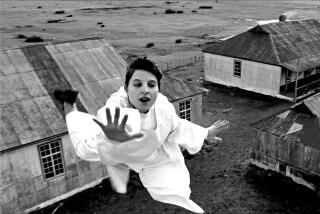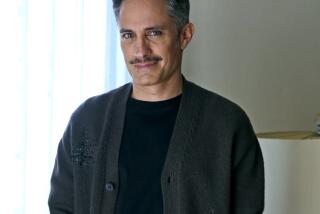‘Exterminating Angel’ at Bunuel’s Table
- Share via
The bad dinner party. You’ve been there, when nobody says anything fresh and even the dependable wits struggle. Time feels like it’s folding over, making the night drag.
OK, look at your watch, back out the front door with a smile. Easy enough. But the guests in Luis Bunuel’s surreal “The Exterminating Angel” don’t have that option. They’re trapped--no exit in sight.
The little-known 1962 movie, screening Friday as part of UC Irvine’s Obscure Desires, Vivid Memories series, is signature Bunuel, a satiric mix of the unusual and the horrifyingly ordinary. When Bunuel’s odd group of diners find they can’t leave, all their flaws--hypocrisies, poses and plotting ways--start to surface.
As they do, events ultimately repeat. Exact lines are delivered again, and responses mirror ones that came earlier. Bunuel, always ready to zap the bourgeoisie, targets their stilted, programmed lives in the most literal fashion.
“The Exterminating Angel” is fantasy filmmaking, the sort that made Bunuel’s reputation from the time he collaborated with painter Salvador Dali on “An Andulasian Dog” in 1928. Bunuel produced some movie bores during a long career (especially when he worked in Spain under the mainstream, state-run film industry of the ‘40s), but his best ones are an about-face to the pedestrian.
After “Los Olvidados,” his famous 1950 look at juvenile delinquency in Mexico, his most influential later pictures are “Nazarin” (1958) and “Viridiana” (1961). Both are heavily metaphorical and steered as much by Bunuel’s surrealistic impulses as anything else. It’s an inspiration that carried Bunuel into “The Exterminating Angel.”
*
The party begins at the home of Nobile (Enrique Rambal) and Lucia (Lucy Gallardo), a misleadingly mundane setting. The guests show up--played by such Bunuel regulars as Silvia Pinal, Patricia de Morelos and Augusto Benedico--and settle in. It’s all a bit strange (what are those sheep doing under the table?) but not too bizarre, until it’s time to go. Then the real weirdness kicks in.
As the visitors become more desperate, their layer of civility falls off like old paint. They turn on their hosts and one another. They throw an ill man’s medicine out and gobble illegal drugs. Lust mingles with hate, and curious couplings ensue.
After a day or two, and with no food left, they think cannibalism might be a good idea.
Sure, it gets a tad creepy, but Bunuel uses the humor of exaggeration to make the film palatable.
He’s presenting unsavory examples of society--it’s easy enough to find them funny as well as despicable. In the end, “The Exterminating Angel” is really a broadside, and not only against the moneyed class.
Religion, another of Bunuel’s peeves, also takes big hits, especially as the movie nears its finale. When the guests seek salvation in the sacred, their pleas come with a price that is, in many ways, just as bad as what they’re praying to be released from. In Bunuel’s world, nothing comes easily, and turning blankly to God just makes things worse.
* What: Luis Bunuel’s “The Exterminating Angel.”
* When: Friday at 7 and 9 p.m.
* Where: UC Irvine’s Student Center Crystal Cove Auditorium near the corner of Bridge Road and Pereira Drive.
* Whereabouts: Take the San Diego (405) Freeway to Jamboree Road, head south to Campus Drive, and take a left. Turn right on Bridge Road and take it into the campus.
* Wherewithal: $2 to $4.
* Where to call: (714) 824-5588.
More to Read
Only good movies
Get the Indie Focus newsletter, Mark Olsen's weekly guide to the world of cinema.
You may occasionally receive promotional content from the Los Angeles Times.










